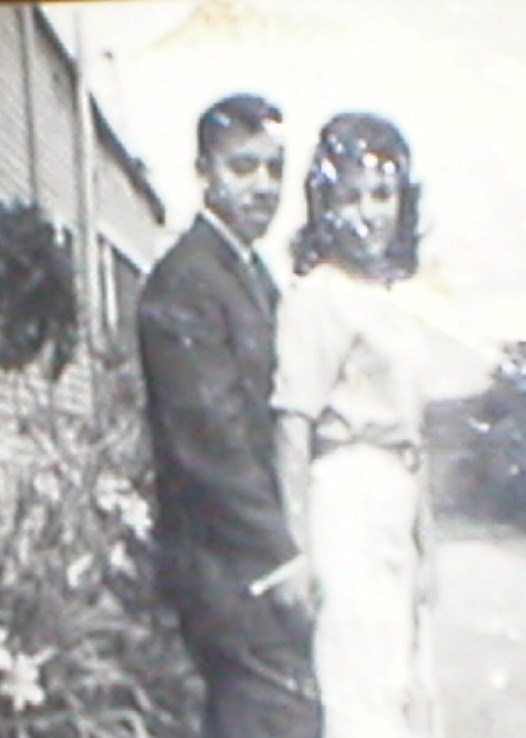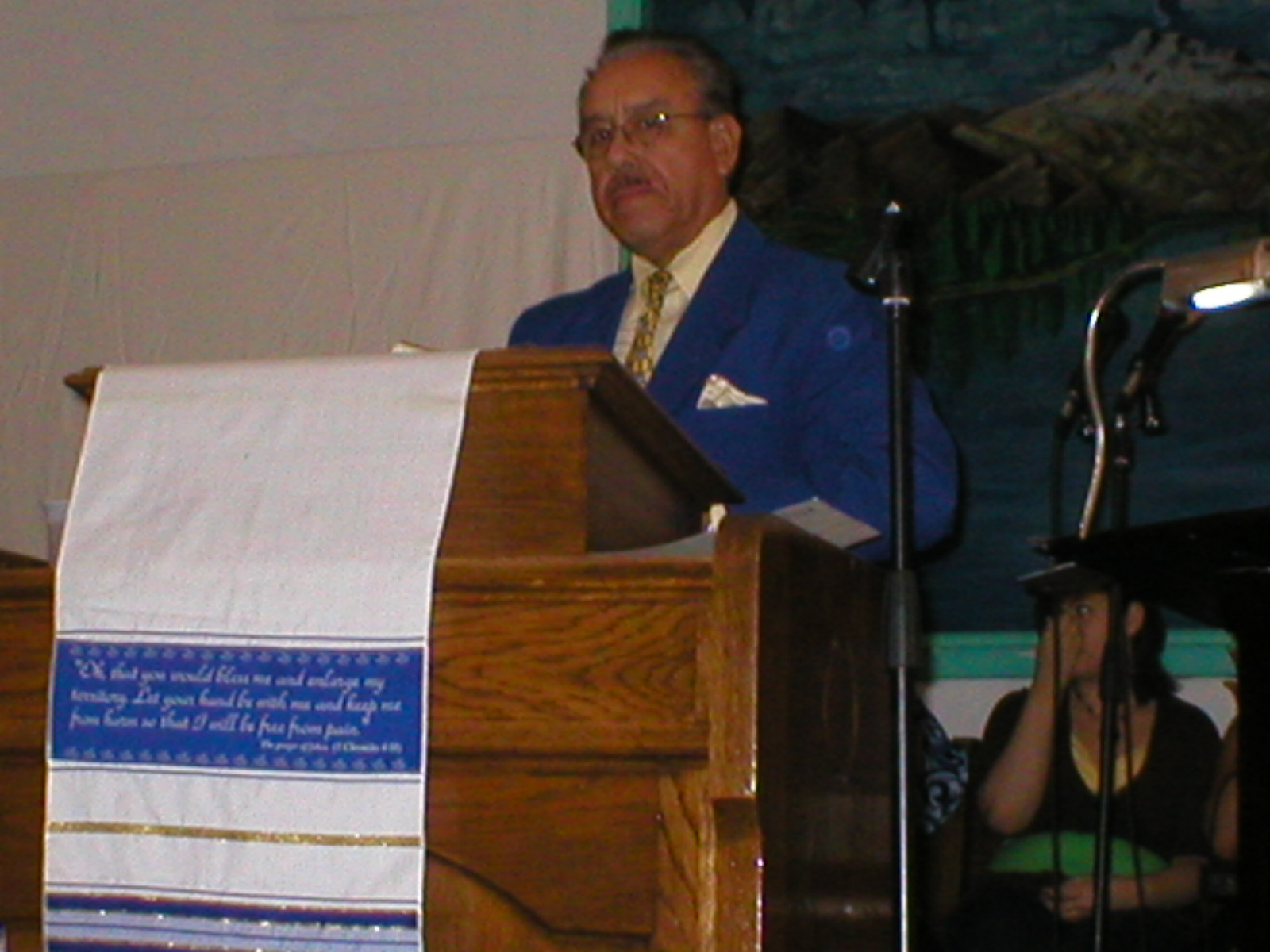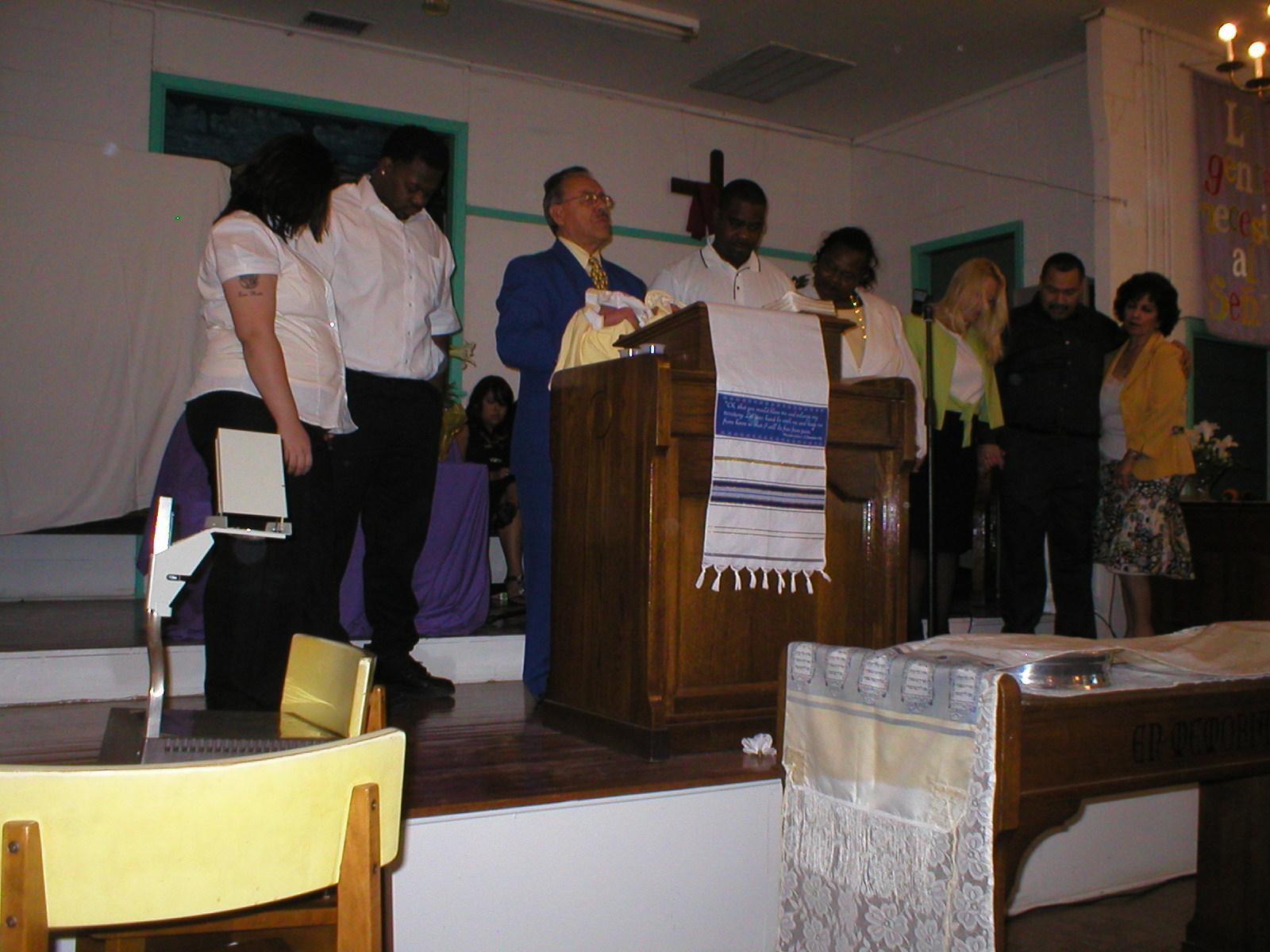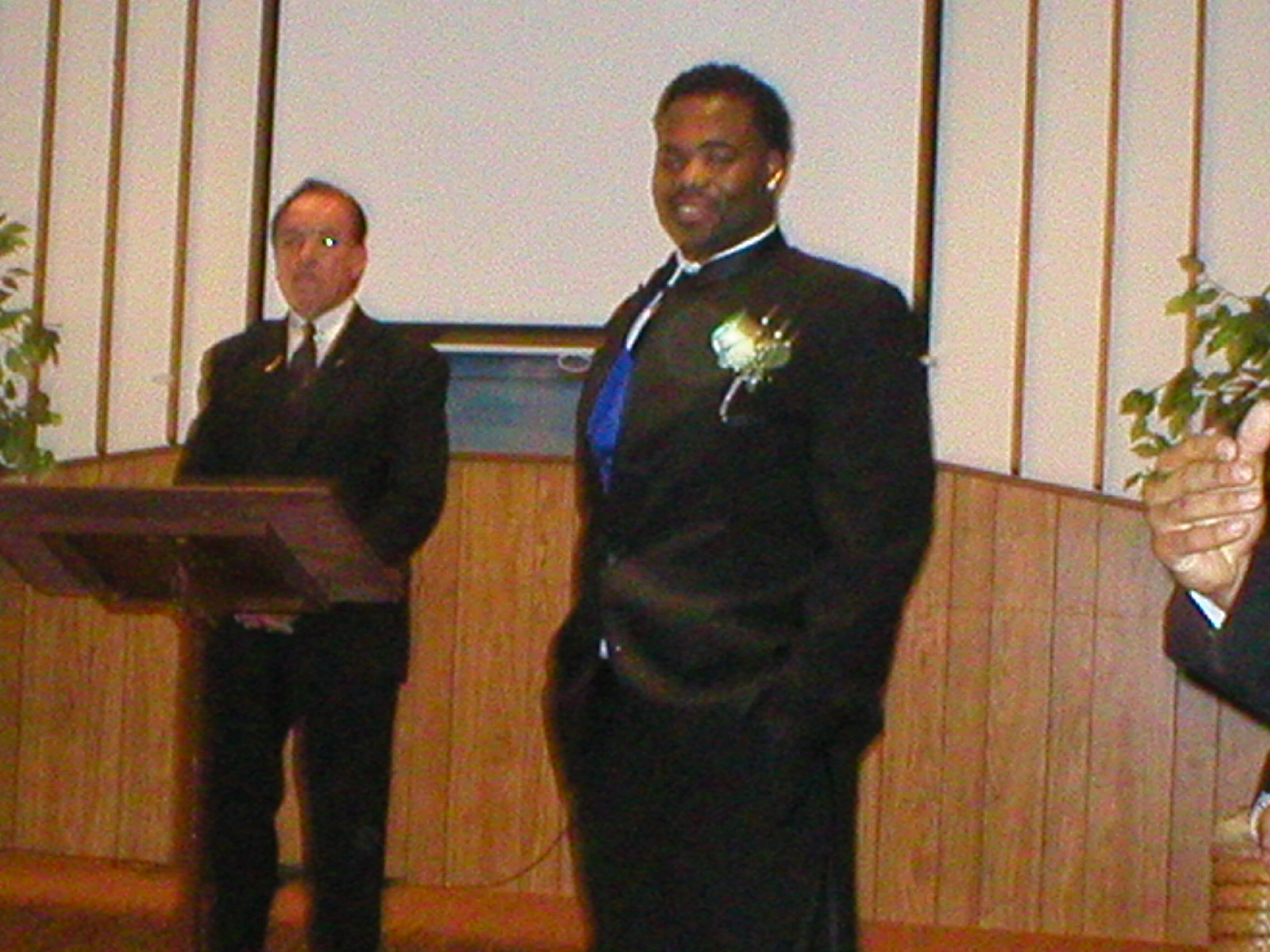TRANSCRIPTION
What type of neighborhood did you grow up in San Antonio?
I grew up in a predominately Hispanic neighborhood on what would be called the near west side of San Antonio. We had a neighbor who was white who was an angleo lady and her husband was a retired policeman.
Have things changed on the west side from when you were growing up to now?
Yes, the west side has changed and I think it has changed for the better. People are more conscious of their surroundings and maybe that's because now all the streets are paved. When I grew up we had to walk through mud, only several main streets were paved, the others good luck. So when it rained and I walked to church or I walked to school, because I had to walk to school, after it rained I always grew three inches from all the mud that kicked under my feet. The west side has changed and people are being more conscious and they are taking care of there properties and taking care of parks and so on, so it's a lot better. One of these days I hope to be Mayor.
Did you grow up in poverty?
Yes I grew up in poverty, all of us had to do something to survive. Our family was not blessed with good jobs and so we did whatever we could to survive. We didn't have any, what I would call luxury's or we didn't have a lot of extras like other people. We'd go to the grocery store and we'd buy just what we were gonna use up that day. My grandmother who raised me, and my brother, and my sister, and grandfather. My grandma would make homemade corn tortilla by hand and my brother and I would go out and sell them door to door by the bakers dozen and we supplemented our income that way.

How was it growing up as a minority in San Antonio?
It was difficult, back in the 50's when I grew up, there was not a lot of opportunities for Hispanics and there was a lot of prejudice. I grew up facing prejudice in my life everywhere I went and I tried my best to fit in everywhere I went and make myself comfortable as much as I could but the interest in minorities getting ahead was not there. I remember that when I graduated from jr. high school, at that time jr. high school ended at 9th grade, I was enrolled at Jefferson high school and I was a minority there also and I started to go there, but I developed pneumonia and than I got double pneumonia so I was out of school for about 3 months, 3 or 4 months. No one came to my house to tutor me or to find out or to ask about me or anything and so when I recovered and went back to school they told me just to wait till the following semester and come back. They didn't think I could make up the work or something and so I came back home and being that we did live in poverty I had to find a little job, and I did, and I just followed my intuition and finally I was able to purchase a car, which was a luxury for me and my neighborhood, I was the only one that had a car of all the guys that lived there and I had to keep on working to pay the car. By the way my car payment was 15 dollars a month and I had a real snappy car and all my buddies wanted to ride with me. Anyway I didn't graduate from high school simply because there was no interest developed in the school system or myself. My brother was the first one to graduate from official high school. I got my GED after I joined the marine corp, but growing up in San Antonio as a minority, it had some difficult times and I faced discrimination first hand and it wasn't something I want to dwell on, but it hurt a lot. And one incident that will never escape my mind, it was gonna be mothers day, and I went downtown on the bus at that time to purchase a head scarf for my mom. By the way my mom and dad were migrant workers and so they would work the crops across the country, and so they left us with grandma so we could go to school, but anyways I went downtown to a major department store by the Alamo and I was looking at the scarf's they were at a counter and there were two white girls that were looking at the same scarfs and one of them looked up and I looked up and I said hello and after I said hello she told me don't speak to me you dirty Mexican. And that hurt me that hurt me deeply it tore into my heart I was just trying to be friendly and neighborly and so on and the sales lady who was an older white lady she heard that and said something to the girl but I don't recall what she said but than she came around the counter and she saw I was hurt and I was crying and she put her arm around my shoulder and said just don't listen to that stuff and than she left but I went to another store and bought what I wanted but I would never forget that.
Where were your parents from?
My parents were first generation Americans they were born here in the United States and my dad and mom were born here in San Antonio. However my grandparents my dad's parents came here from Mexico and my grandfather was a carpenter by trade.
Did you play any sports growing up?
Yes I did, I liked to participate in tracking events, my favorite one was the hoop, skip, and jump, the long jump, the relays, the hundred yards and also the high jump. I had a real good time, so when the coach came to my house to talk to my grandmother about me joining the football team she told him no because I had to work. That I was a man and that I had to learn how to be responsible, So I wasn't able to continue that. After that growing up I played sports whenever I could, the main sport being softball I played fast pitch and than I began playing baseball, than I played semi-pro ball in Los Angeles. Baseball has been my favorite sport.
At what age did you begin to work? What was your first job?
I was fifteen years old, as an official job, I mean I was always working at home like I mentioned my brother and I would go door to door selling handmade corn tortillas, we had an established route and all that, but my first official job was as a delivery person for an engraving shop and it was a small operation and I had my car, and I would deliver engraving stuff that they would make for newspapers and magazines and different outfits, that was my first job. By the way I was getting paid fifteen dollars a week.
What was your first car?
It was a 1950 Mercury 4 door and it had the suicide doors and fender skirts and I went to a friend of mine and he lowered the back end and we shaved off the door handles and we put some fake radio antennas in the back and had a swinging name plate behind the car that said road aces and I copied that off of a movie that I had seen and it was the envy of the neighborhood. We had a lot of good times and a lot of fun times in that car.
What was your favorite thing to do on your weekends in San Antonio?
My favorite thing to do on the weekend? Oh that was going to the river to go swimming, I love water sports also. We'd go to the river, Medina River and go swimming and you know I never knew you couldn't open your eyes under that water, and I did and others, but my favorite thing was going to the river and going swimming and coming home and eating hot dogs and hamburgers.
How much was gas when you were in high school?
Oh gas prices, back than I remember paying eleven cents a gallon at an independent gas station and the average price was around twenty one cents but I paid eleven cents a gallon one time, I'll never forget that.
What made you decide to go to the Marines?
Well it was something that all the other guys were doing, actually I tried to join the Navy first and the Navy recruiter turned me down because I had a bad ear, and they wanted me, because of my height to become part of the submarine fleet, but I couldn't withstand the pressure. A friend of mine came and he wanted to join the Marines and he wanted me to go with him and so I said okay lets go I know I'm not going to pass because I got turned down by the Navy some months back. We went to join up for the Marines and took all the test and I passed everything, and took the physical, he failed and I passed, so I wound up in San Diego for Marine Corp boot camp. For three years and back in the sixty's I was stationed with Harvey Oswald at the Third Marine Air wing, that's for a Marine base. I got out of the Marines after three years, I was out for about a year and a half and Berlin Crisis and so I was called back in and I was the Cuban Christ. Than I was asked to join again, so I went back to active duty for another two years. I served one year and everything died down and so I served a total of four years.

What was the most interesting thing you had to go through in the Marines?
Every Marine will tell you the same thing, Boot Camp. The drill instructors that were handling the platoon, the group that I was in, they were experienced, they were veterans, and they were mean, no other word for it and the hardest thing for most of the guys, not really so much for me, it was something the DI said, the instructor said, "I'm going to teach you in fourteen weeks what your parents couldn't teach you in eighteen years," That was discipline and of course I was use to it, but it was hard because of the words I wasn't use to hearing. All the cursing by these guys that didn't happen at home and so I just wasn't use to that and that was the most traumatic part other than the physical affect. The running, jumping, doing push up, sit ups, there where chin ups, carrying all the heavy gear and walking up and down hills and all that. The training it was a hard experience but I survived and I had some buddies that I got acquainted with and we became friends after that. We got stationed together, some of us, and we continued that friendship.
What made you decide to become a pastor?
I didn't decide in a way to become a pastor, I had always been involved in church activities with my family. My grandmother, my mom, and my uncles were also involved. I had a calling in music, I became a singer and started singing gospel music, I started at a very young age and started using it in the ministry when I was fifteen years old and I had an opportunity to travel to many, many places through my music. Than as I matured in that ministry, in that area, I would always work with good speakers and I would listen to them, than one day I was asked to cover for them for a certain event, and I felt comfortable and felt like that was something I wanted to do in my ministry and that later on took priority over my music, although I still do both.
What type of ministry work did you do?
Well I was a Choir Director most of the time. Choir Director, I was a Sunday school, I love bible stories, bible mystery, and bible teaching. I enjoyed working with young people and children and that's were it all got started.

Where is the most interesting place you've ever been?
I would have to say that it was Israel; yes I was blessed to go to the holy land. The most exciting part of that trip was going inside the empty tomb. The empty tomb was so significant, it was so emotional that it made me cry it had quite an impact on me. Several other places as well, the manger were Christ was born and the Calvary were Christ died and so on. This Holy Land experience in Israel, tasting the kosher food, a lot of the places that I had read about in the bible, experiencing the boat ride on the sea of Gallaly, and why I wanted to try and walk on the water too, I wanted to step off that boat. Over the years that I look back that I treasured, a lot of things from the Holy Land will always stick in my mind.
Do you have any family tradition that you want to keep?
I try to keep one of them going were I have breakfast with my boys, my five boys and my grandson's, that I started years ago and to me it's a time of binding and connecting.
What was the most rewarding thing you've done as a pastor
The most rewarding thing I've done as a pastor was that I've had the blessing of baptizing my children and grandchildren.

What is Fiesta like?
Fiesta to me is such a wonderful experience and with years past it was about coming together you'd meet new friends, you'd meet your neighbors, you'd enjoy different foods, the music, the carnival, just the commodity, the crowds. I'm a crowd person, other people are not, but I am, I'm a crowd person and I like being in big crowds, and I like noise, and I like music, I like loud music, and all that stuff you know it doesn't bother me. Fiesta was at that time, a time of happiness and joy and having a good time, sadly in the last years, because of unsavory individuals, things have gotten kind of bad and folks don't visit some of those areas of Fiesta, and that's sad. Overall Fiesta to me was enjoying and not regretting.

Is there anything else you would like to add to this interview?
The only thing I would say is that I've seen a lot of changes, I did move away when I joined the Marine corp. and spent four years in California. After I got out of the Marine Corp in 1962 and I stayed in the Los Angeles area, I got married over there and I stayed over there and I lived in the southern California area for almost twenty-one years. Than I came back home, and I would come back to San Antonio to see my grandma and than to see the rest of my family, I had a lot of cousins and a lot of aunt's and uncles. Every time I would come back I would notice something different, but I would always remember San Antonio. The thing that I most remembered when I was living in Los Angeles was walking down the river walk, going to eat at the malt house to eat a juicy burger and big fries and of course in April I would think of Fiesta. I would always remember that in my dreams, and in my hopes I would always remember San Antonio. So I would come every summer to see grandma and so on, but my heart was always here, even though the Lakers were my favorite basketball team. Now there not, they haven't been, and they won't be because I'm a Spurs fan. San Antonio has always mattered to me and I would like to make a bigger contribution to make it better and do my part.

